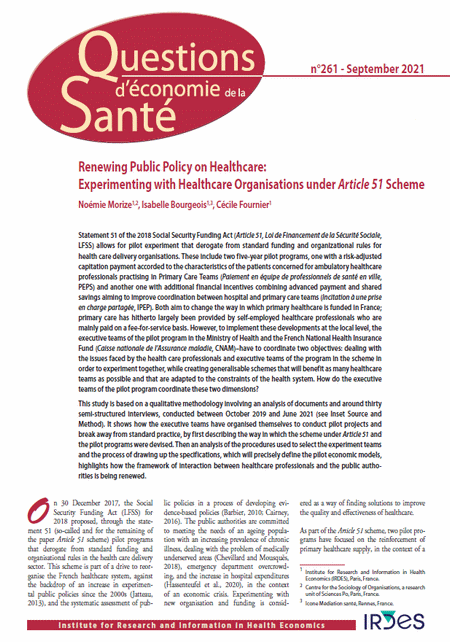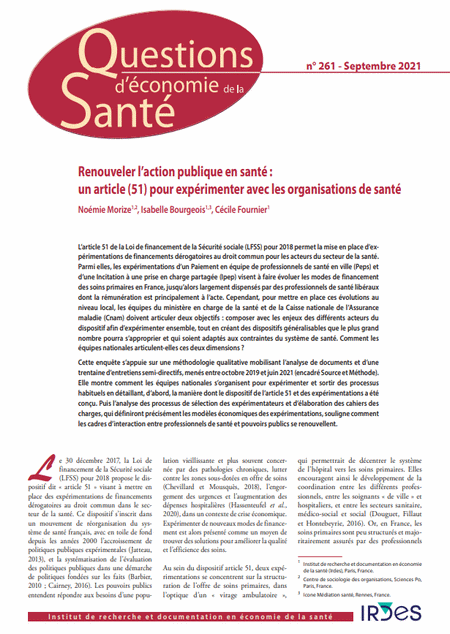Renewing Public Policy on Healthcare: Experimenting with Healthcare Organisations under Article 51 Scheme
Morize N. (IRDES, Centre for the Sociology of Organisations, a research unit of Sciences Po), Bourgeois I. (IRDES, Icone Médiation santé), Fournier C. (IRDES)
Questions d'économie de la santé (Issues in Health Economics) n° 261 - September 2021
ABSTRACT
Statement 51 of the 2018 Social Security Funding Act (Article 51, Loi de Financement de la Sécurité Sociale, LFSS) allows for pilot experiment that derogate from standard funding and organizational rules for health care delivery organisations. These include two five-year pilot programs, one with a risk-adjusted capitation payment accorded to the characteristics of the patients concerned for ambulatory healthcare professionals practising in Primary Care Teams (Paiement en équipe de professionnels de santé en ville, PEPS) and another one with additional financial incentives combining advanced payment and shared savings aiming to improve coordination between hospital and primary care teams (Incitation à une prise en charge partagée, IPEP). Both aim to change the way in which primary healthcare is funded in France; primary care has hitherto largely been provided by self-employed healthcare professionals who are mainly paid on a fee-for-service basis. However, to implement these developments at the local level, the executive teams of the pilot program in the Ministry of Health and the French National Health Insurance Fund (Caisse nationale de l'Assurance maladie, CNAM)-have to coordinate two objectives: dealing with the issues faced by the health care professionals and executive teams of the program in the scheme in order to experiment together, while creating generalisable schemes that will benefit as many healthcare teams as possible and that are adapted to the constraints of the health system. How do the executive teams of the pilot program coordinate these two dimensions?
This study is based on a qualitative methodology involving an analysis of documents and around thirty semi-structured interviews, conducted between October 2019 and June 2021 (see Inset Source and Method). It shows how the executive teams have organised themselves to conduct pilot projects and break away from standard practice, by first describing the way in which the scheme under Article 51 and the pilot programs were devised. Then an analysis of the procedures used to select the experiment teams and the process of drawing up the specifications, which will precisely define the pilot economic models, highlights how the framework of interaction between healthcare professionals and the public autho-rities is being renewed.
See also Questions d'économie de la santé n° 261 in French: Renouveler l'action publique en santé : un article (51) pour expérimenter avec les organisations de santé.

